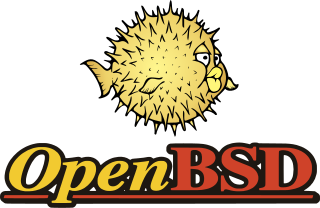
The Apache HTTP Server, colloquially called Apache, is a free and open-source cross-platform web server software, released under the terms of Apache License 2.0. Apache is developed and maintained by an open community of developers under the auspices of the Apache Software Foundation.
Secure Shell (SSH) is a cryptographic network protocol for operating network services securely over an unsecured network. Typical applications include remote command-line, login, and remote command execution, but any network service can be secured with SSH.
The Mozilla Foundation is an American non-profit organization that exists to support and collectively lead the open source Mozilla project. Founded in July 2003, the organization sets the policies that govern development, operates key infrastructure and controls Mozilla trademarks and copyrights. It owns a taxable subsidiary: the Mozilla Corporation, which employs many Mozilla developers and coordinates releases of the Mozilla Firefox web browser and Mozilla Thunderbird email client. The Mozilla Foundation was founded by the Netscape-affiliated Mozilla Organization. The organization is currently based in the Silicon Valley city of Mountain View, California, United States.

OpenSSL is a software library for applications that secure communications over computer networks against eavesdropping or need to identify the party at the other end. It is widely used by Internet servers, including the majority of HTTPS websites.
OpenAFS is an open-source implementation of the Andrew distributed file system (AFS). AFS was originally developed at Carnegie Mellon University, and developed as a commercial product by the Transarc Corporation, which was subsequently acquired by IBM. At LinuxWorld on 15 August 2000, IBM announced their plans to release a version of their commercial AFS product under the IBM Public License. This became OpenAFS. Today, OpenAFS is actively developed for a wide range of operating system families including: AIX, Mac OS X, Darwin, HP-UX, Irix, Solaris, Linux, Microsoft Windows, FreeBSD, NetBSD.

FreeBSD is a free and open-source Unix-like operating system descended from the Berkeley Software Distribution (BSD), which was based on Research Unix. The first version of FreeBSD was released in 1993. In 2005, FreeBSD was the most popular open-source BSD operating system, accounting for more than three-quarters of all installed simply, permissively licensed BSD systems.
Tinc is an open-source, self-routing, mesh networking protocol and software implementation used for compressed and encrypted virtual private networks. It was started in 1998 by Guus Sliepen, Ivo Timmermans, and Wessel Dankers, and released as a GPL-licensed project.

In computing, a cryptographic accelerator is a co-processor designed specifically to perform computationally intensive cryptographic operations, doing so far more efficiently than the general-purpose CPU. Because many servers' system load consists mostly of cryptographic operations, this can greatly increase performance.
In cryptography, Curve25519 is an elliptic curve offering 128 bits of security and designed for use with the elliptic curve Diffie–Hellman (ECDH) key agreement scheme. It is one of the fastest ECC curves and is not covered by any known patents. The reference implementation is public domain software.

OpenBSD is a security-focused, free and open-source, Unix-like operating system based on the Berkeley Software Distribution (BSD). Theo de Raadt created OpenBSD in 1995 by forking NetBSD. According to the website, the OpenBSD project emphasizes "portability, standardization, correctness, proactive security and integrated cryptography."
ssh-keygen is a standard component of the Secure Shell (SSH) protocol suite found on Unix, Unix-like and Microsoft Windows computer systems used to establish secure shell sessions between remote computers over insecure networks, through the use of various cryptographic techniques. The ssh-keygen utility is used to generate, manage, and convert authentication keys.

OpenSSH is a suite of secure networking utilities based on the Secure Shell (SSH) protocol, which provides a secure channel over an unsecured network in a client–server architecture.

LibreOffice is a free and open-source office productivity software suite, a project of The Document Foundation (TDF). It was forked in 2010 from OpenOffice.org, which was an open-sourced version of the earlier StarOffice. The LibreOffice suite consists of programs for word processing, creating and editing of spreadsheets, slideshows, diagrams and drawings, working with databases, and composing mathematical formulae. It is available in 115 languages.
The Transport Layer Security (TLS) protocol provides the ability to secure communications across networks. This comparison of TLS implementations compares several of the most notable libraries. There are several TLS implementations which are free software and open source.

Apache OpenOffice (AOO) is an open-source office productivity software suite. It is one of the successor projects of OpenOffice.org and the designated successor of IBM Lotus Symphony. It is a close cousin of LibreOffice and NeoOffice. It contains a word processor (Writer), a spreadsheet (Calc), a presentation application (Impress), a drawing application (Draw), a formula editor (Math), and a database management application (Base).

LibreSSL is an open-source implementation of the Transport Layer Security (TLS) protocol. The implementation is named after Secure Sockets Layer (SSL), the deprecated predecessor of TLS, for which support was removed in release 2.3.0. The OpenBSD project forked LibreSSL from OpenSSL 1.0.1g in April 2014 as a response to the Heartbleed security vulnerability, with the goals of modernizing the codebase, improving security, and applying development best practices.
The Core Infrastructure Initiative (CII) is a project of the Linux Foundation to fund and support free and open-source software projects that are critical to the functioning of the Internet and other major information systems. The project was announced on 24 April 2014 in the wake of Heartbleed, a critical security bug in OpenSSL that is used on millions of websites.

Hyperbola GNU/Linux-libre is an operating system for the i686 and x86-64 architectures. It is based on Arch snapshots and Debian development. It includes the GNU operating system components and the Linux-libre kernel instead of the generic Linux kernel. Hyperbola GNU/Linux-libre is listed by the Free Software Foundation as a completely free operating system, true to their Free System Distribution Guidelines.
Microsoft, a technology company known for its opposition to the open source software paradigm, turned to embrace the approach in the 2010s. From the 1970s through 2000s under CEOs Bill Gates and Steve Ballmer, Microsoft viewed the community creation and sharing of communal code, later to be known as free and open source software, as a threat to its business, and both executives spoke negatively against it. In the 2010s, as the industry turned towards cloud, embedded, and mobile computing—technologies powered by open source advances—CEO Satya Nadella led Microsoft towards open source adoption although Microsoft's traditional Windows business continued to grow throughout this period generating revenues of 26.8 billion in the third quarter of 2018, while Microsoft's Azure cloud revenues nearly doubled.








